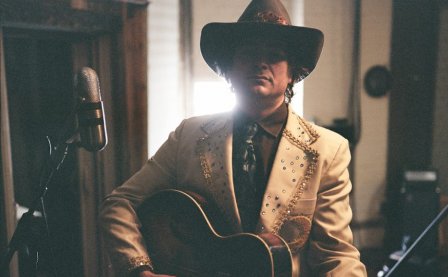Country songs tell us how we got to where we are. Case in point, “That’s How I Got to Memphis,” the 1969 song by Tom T. Hall that opens Karl Blau’s tremendous new covers record, Introducing Karl Blau. In the song, the narrator arrives in Memphis over and over, drawn repeatedly by love and looping the song’s title as a cathartic refrain. For the final minute, the piano takes the reins, the drums kick up some dust, and sublime vocal support carries us to another plane. The narrator finds himself redeemed, less from his ruts than by them.
The song repeats itself, but it’s not redundant. Anyone who has ever tried and failed to craft a country song appreciates the delicacy of that difference, which Karl Blau has finessed. Since 1996, he’s recorded over 40 albums in a range of genres, making this newest album’s title a front. The man needs no introduction. That said, the title hints at the subtle play with form at the heart of folk narratives, in which things often start only once they’ve already begun. On one of the 10 tunes covered here, Link Ray’s “Fallin’ Rain,” Blau sings of this confused temporality: “I’m up, then I’m down/ Tell me where is it going to end/ You say start at the beginning/ Of the end my friend.”
His anachronistic croon channels mid-century outlaw country, picking up other traces along the way: folk country’s 70s hi-fi iteration, as well as its 90s “alternative” redux. The result here is a neo-Nashville compromise between K Records pop group LAKE — with an ounce more swagger — and their New Jersey jam-inflected country kin, Communipaw. The sound is realized on the record by a glistening band, exquisitely produced by Tucker Martine.
Blau’s musical siblings in the Pacific Northwest have always flirted with country roots, from local legend Calvin Johnson’s cowboy pseudo-bravado to Mirah’s cowgirl takedown of that same pomp on her brief, searing tune “Lone Star.” Another nearby influence seems to be the late Elliott Smith, whose blues lifted only when he sang about George Jones. Smith’s guiltiest pleasure was supposedly the pop-country outfit Big Star, and that tradition’s sentimentality slides, literally, into a few of Blau and the band’s covers here.
On the surface, there’s nothing in this world less appealing than Don Gibson’s 1972 hit “Woman (Sensuous Woman),” and Blau’s version reproduces the original’s anti-charm. It offends with its guilelessness. But that’s what I like about it, and for a minute, I felt sure Blau was singing to me only. The songs sink in. I could listen to “Fallin’ Rain” all morning, and I did. It doesn’t make sense until the refrain hits, but once it does, it pulls you under for a while.
The canon of modern country from which these songs were gleaned deals, in Benjamin Nugent’s words, in “disavowals of vice and caustic self-portraits,” but Blau’s choice of material avoids the legacy’s grimmest moments. Country has rarely been nearer to yet freer from despair than in his hands. He included the tender Townes van Zandt tune “If I Needed You,” but Hank Williams laments are nowhere to be found. Although Blau comes close to crying a couple times, he never does. “Some days are just lonely days,” he reminds us on “Let the World Go By.” We believe him when he sings it; it just don’t pay to cry.
They classify Karl Blau’s music as country soul, but I’m going to shoot straight with y’all: this record transcends genre and everybody knows it. Country music is haggard and calloused and hung up on itself, and Introducing Karl Blau is none of those things. The narrator only lingers a little in the places he’s been — the songs tell us where we came from so we don’t have to go there anymore.
More about: Karl Blau




